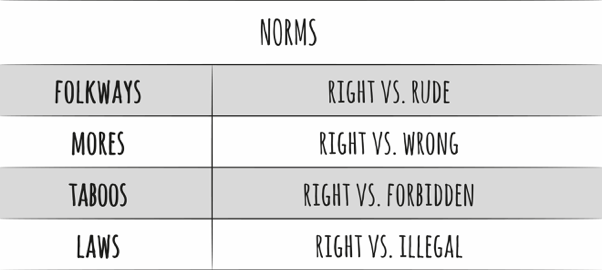Do you remember our four groupings of social norms – folkways, mores, taboos, and laws?
If not, then here’s our handy chart to recall how each of these norms applies to culture:

As you can imagine, failing to queue up in Britain would not be looked upon as severely as, say, going topless at a beach in America. And this is due to the severity of the norm groupings to which each of these actions belong.
Folkways<Mores<Taboos<Laws
How strict is each cultural norm group?
Folkways are the softest social norms. While you have a choice whether or not to adapt to folkways, failing to adapt won’t lead to ostracism; it will simply lead some in your new cultural environment to consider you a bit rude.
One example: wearing formal attire in a business environment is a European folkway. A suit and tie in Europe is the uniform of choice for men.
So, when an American male manager walks into a business meeting with his European counterparts wearing a casual polo shirt and wrinkled slacks, while this casual attire is, of course, not forbidden, it may result in a negative perception of said businessman as a cross-cultural business leader.
This is one example of a folkway that you can choose to adapt or not, but in making that choice, consider how it’s perceived.
Mores define right versus wrong within a culture, so there is more pressure to adapt to this type of social norm.
For instance, if a female manager travels to a conservative country, and she comes from one where feminine business attire is much more liberal, she may feel pressured – or even be asked – to alter her attire, as it may be considered inappropriate or revealing, based on the culture’s mores.
This is the difference between “right vs rude” and “right vs wrong”. Again, you can choose to adapt or not, but in the process, you may be considered “rude” or “wrong” by the cultural standards of your new colleagues.
Mandatory Adaptions
When it comes to the last two social norm groups – taboos and laws -, you must adapt.
Remember, taboos define what’s forbidden, while laws define what’s illegal. If these norms don’t align with your own, and you believe there’ll be some “wiggle-room”, simply because you’re a foreigner, then you’re very much mistaken.
“Sorry, I didn’t know; I’m foreign,” might work when breaking a queue, but it certainly won’t work when breaking a law.
You must accept that other cultures have values that you must observe if you choose to live there. And if you can’t accept these deeply entrenched values and norms, then stand by your principles and don’t move there.
Because one thing is certain in building cross-cultural relationships: you should not expect an entire culture to bend to your will.
